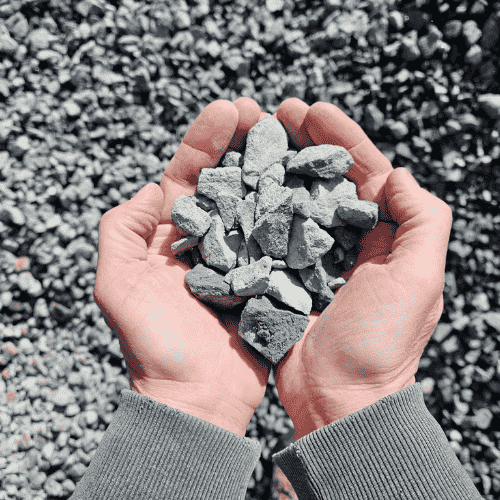
When water management is a top priority—whether it’s for a backyard, foundation, driveway, or construction site—gravel is often the unsung hero of the job. But not all gravel is created equal. Choosing the right type of gravel for drainage can mean the difference between a soggy mess and a functional, long-lasting system.
If you’re in New Jersey, particularly around Hunterdon County, Morris County, or Sussex County, and you’re searching for reliable materials for your drainage project, Kirk Allen Landscape Supply is your trusted local source. With years of experience in supplying quality gravel and aggregate, we’ll guide you through everything you need to know to make an informed choice.
Why Gravel Is Used for Drainage
Gravel plays a crucial role in moving water away from areas where it can cause damage. Whether it’s surface runoff or groundwater, gravel helps in:
- Preventing water pooling
- Protecting foundations
- Reducing erosion
- Enhancing soil drainage
- Supporting French drains or dry wells
The key is porosity—the ability of gravel to allow water to pass through quickly without compacting. That’s why choosing the right kind of gravel is essential.
Top Gravel Types for Drainage Projects
Here are the most commonly recommended gravel types for effective drainage systems:
1. Crushed Stone #57 (3/4” Gravel)
This is one of the most versatile and popular choices for drainage in both residential and commercial applications.
- Size: ¾ inch
- Best For: French drains, foundation drainage, septic systems
- Why It Works: The angular shape allows for optimal water flow and prevents clogging.
2. Pea Gravel
Pea gravel is small, round, and smooth, making it a great option for decorative drainage—but not always ideal for structural use.
- Size: ⅜ inch
- Best For: Walkways, decorative trenches, top layer of French drains
- Drawback: May compact over time, which limits long-term water flow efficiency.
3. Crushed Stone #3
Larger than #57 gravel, Crushed Stone #3 is used in more robust drainage applications.
- Size: 1–2 inches
- Best For: Large-scale projects like erosion control, culvert fill, and retaining wall backfill
- Why It Works: The large size makes it suitable for moving significant volumes of water.
4. Washed Clean Stone
Washed gravel has been rinsed to remove dirt, clay, and sand—making it more permeable and clean.
- Best For: Around foundations and under concrete slabs
- Benefit: Prevents the buildup of sediment that can hinder water flow.
5. Bank Run Gravel
A mix of sand, stone, and dirt, this material is less expensive but may not be suitable for detailed or long-term drainage due to its inconsistencies.
- Best For: Fill material or temporary solutions
- Warning: Not ideal where consistent water movement is required.
How to Choose the Right Gravel for Your Project
Choosing the right type of gravel comes down to the scope and location of your project:
- For French Drains: Crushed stone #57 is your best bet. It balances drainage and stability.
- For Decorative Drainage Beds: Pea gravel is visually appealing and good for low-flow situations.
- For Foundations: Use washed gravel or crushed stone #3 to provide a solid, well-draining base.
- For Driveways or Patios with Drainage: Crushed stone topped with smaller gravel or sand provides stability and flow.
If you’re not sure which option to go with, Kirk Allen Landscape Supply can help assess your needs based on site conditions and drainage goals.
How Much Gravel Do You Need?
Gravel is typically sold by the cubic yard. Here’s a simple formula to help estimate your needs:
Length (ft) × Width (ft) × Depth (ft) ÷ 27 = Cubic Yards
For example, for a 10′ x 10′ drainage bed at 6 inches deep:
10 × 10 × 0.5 ÷ 27 = 1.85 cubic yards
It’s always a good idea to order 5–10% more to account for compaction and settling.
Where to Buy Gravel for Drainage in NJ
If you’re looking for bulk gravel delivery in Hunterdon, Morris, or Sussex County, Kirk Allen Landscape Supply is a trusted supplier with a wide range of drainage stone options in stock. We offer:
- Bulk pickup and delivery
- Competitive pricing
- Knowledgeable staff to help you choose the best material
Our team is committed to making your drainage project successful—whether you’re a DIY homeowner or a professional contractor.
Tips for Installing Drainage Gravel Properly
- Use a Perforated Pipe: In French drains or yard drainage, place a perforated pipe wrapped in landscape fabric below the gravel layer.
- Don’t Skip the Fabric: Use landscaping fabric to separate gravel from soil and prevent clogging.
- Ensure Slope: Make sure your trench or area slopes downward to direct water flow properly (a 1% slope is standard).
- Compact Each Layer: Use a tamper or plate compactor to firm the base and layers of gravel.
Why Work with Kirk Allen Landscape Supply?
✅ Local & Experienced – Serving Northern NJ since 1985
✅ Bulk Materials – Mulch, topsoil, gravel, decorative stone, and more
✅ Delivery Available – Prompt and reliable right to your site
✅ Expert Guidance – We help you pick the right materials and quantities
✅ Convenient Location – Centrally located near Route 206 and 80
Final Thoughts
When it comes to effective drainage, not just any gravel will do. Choosing the right type—and installing it properly—can protect your landscape, home, and structures from long-term water damage. Whether you’re handling a small backyard project or a major site development, the right materials are key.
For expert recommendations and high-quality drainage gravel in New Jersey, contact Kirk Allen Landscape Supply at 973-347-3117 or visit www.kirkallenlandscapesupply.com.

